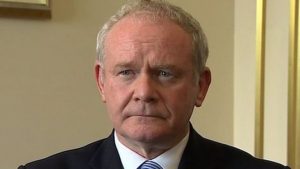
By Susan Gately - 24 March, 2017

Former US President Bill Clinton
Speaking at the end of the funeral Mass of Martin McGuinness, the IRA commander who became a mainstay of the peace process, former US President Bill Clinton said lasting peace could only take hold and endure “if those who have legitimate grief on both sides embrace the future together”.
He had been asked to speak of McGuinness for three minutes. “He could do this in 30 seconds. I can just hear him now. ‘Here’s my eulogy. I fought, I made peace, I made politics. I had a fabulous family that somehow stayed with me and endured it all. I had friends. I was married to Gerry [Adams] almost as long as I was married to Bernie. It turned out I was pretty good at this and we got a lot done but we didn’t finish and if you really want to honour my legacy, go make your own and finish. Finish the work of peace so we can all have a future together’”.
The former president said that he had treasured every encounter with Mr McGuinness, who had grown up at a time of “rage and resentment, not only in Ireland but across the world. He hated the discrimination; he decided to oppose it by whatever means available to the passionate young, including violence. Somewhere along the way, for whatever reason, he decided to give peace a chance. Some of the reasons were principled, some were practical.”
Martin McGuinness, he said, was “good about sticking with something he decided to do and he succeeded because his word was good, his listening skills were good, he was not afraid to make a compromise and he was strong enough to keep it if he made it.”
 One of the things of which Martin McGuinness was proudest, said Mr Clinton, was his large allocation of funds, as Education Minister, to the poorest schools in Protestant areas. He understood the “only way out of poverty, to give people the emotional space to live together and work together, was if they could have the dignity of a decent job and the empowerment of knowing they could take care of their children.”
One of the things of which Martin McGuinness was proudest, said Mr Clinton, was his large allocation of funds, as Education Minister, to the poorest schools in Protestant areas. He understood the “only way out of poverty, to give people the emotional space to live together and work together, was if they could have the dignity of a decent job and the empowerment of knowing they could take care of their children.”
He never stopped being who he was, he continued – a good husband, a good father, a faithful follower of the faith of his fathers and mothers and a passionate believer in a free, secure, self-governing Ireland. The only thing that happened was that he expanded the definition of ‘us’ and shrunk the definition of ‘them’, said Mr Clinton.
“Our friend earned this vast crowd today,” he added.
Thousands of people attended the funeral at St Columba’s Church in Derry. Mr McGuinness’s wife Bernie and children Gráinne, Fionnuala, Fiachra and Emmet escorted the coffin, draped in a tricolour, out of their house on Westland Terrace. Thousands lined the streets of Derry as the funeral cortege passed by. A piper played ‘Amazing Grace’ as the coffin was carried though the crowds into the church.
Inside, dignitaries included President Michael D. Higgins and former President Mary McAleese, Taoiseach Enda Kenny, former taoisigh Bertie Ahern and Brian Cowen, Northern Secretary James Brokenshire, John Hume and PSNI chief Constable George Hamilton. Northern Ireland’s former First Minister Arlene Foster received a particular welcome and was applauded during the service.
In his homily Fr Michael Canny referred to an inscription on a plaque in St Paul’s cathedral, where its celebrated architect Sir Christopher Wren is buried: “Reader, if you seek his monument – look around you.”
“If you seek Martin McGuinness’s monument, his legacy – look around you, at the people gathered in this church. There are people in this church today whose presence would have been unthinkable only a generation ago.
“Martin like all of us, was a complex man, a remarkable man on a remarkable journey. He realised that the time for peace had come and he pursued the peace process with relentless energy for the rest of his days, until illness finally struck him down.
“In the course of that journey he encountered many obstacles but he remained resolute. In conversation he often repeated that there was no other way, we had to continually work for the building of peace and a better future for all. Despite many setbacks he was always insistent that we should never became disheartened.”
Two Protestant ministers – Rev Harold Good and Rev David Latimer – read prayers of the faithful and spoke movingly of their friendship with Mr McGuinness during the service.